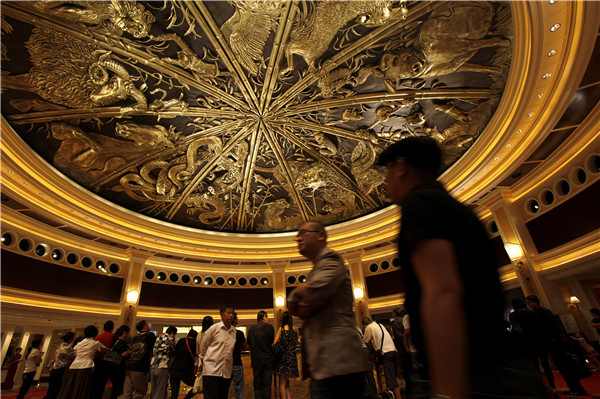 |
|
Tourists walk inside the Wynn Macao hotel, a chain of the Las Vegas casino operator Wynn Resorts.REUTERS |
The game has changed in Macao.
The world's largest gambling center has undergone a painful transformation, with new resorts on the Cotai Strip betting big on the idea that it can be Asia's version of the Las Vegas Strip, where family-friendly entertainment will hold mass appeal.
Casino operators have been desperate to sustain the decade-long red hot growth in the aftermath of Beijing's clampdown on corruption and extravagance. They hope the new casinos with more non-gambling attractions will breathe life back into the Macao economy.
Melco Crown's Studio City, for instance, made its debut later last year as a Hollywood-inspired gambling and entertainment complex with a Batman virtual reality ride and Ferris wheel. US billionaire Sheldon Adelson's Parisian Macao, which opened last week, features a half-scale replica of the Eiffel Tower.
"Casino itself is a passive business and only about gambling. It is just a superficial and inaccurate description of Wynn and its rivals' businesses in Macao," said Las Vegas casino magnate Steve Wynn, whose "luxury-for-all" $4.2 billion lavish resort Wynn Palace opened last month with air-conditioned cable car rides and musical fountain shows as the highlights.
"What makes Macao wonderful is the diversity of hospitality attractions on the Cotai Strip. It is the combination of hotels, restaurants and shopping malls that lure people to come here," said Wynn.
The most expensive casino to date in the gambling mecca has some $3.6 billion worth of non-gambling amenities, pointing to a big trend of reinventing the territory into an amusement park with more family-oriented attractions.
This all echoes Macao government's determination to boost the share of the industry's non-gambling revenues from 6.9 percent in 2014 to 9 percent by 2020.
However, pivoting to a new model of growth may prove a daunting task for the small peninsula.
The much-touted non-gambling business model is nothing new and can be compared to new tourist attractions on the mainland like Shanghai Disneyland, said Stanley Au Chong-kit, chairman of Macao-based bank Delta Asia Financial Group.
Ambitious casino operators may go too far down the new route than what the core gaming market could accept at the moment, and the big bet on family-oriented entertainment may well be shrugged off by customers, said Zeng Zhonglu, professor of the Gaming Teaching and Research Center of the Macao Polytechnic Institute.
His view may have been shaped by the fact that the world's most famous live spectacle, Cirque du Soleil, completed only three-and-a-half years of its 10-year contract with Sands China and exited Macao in 2012 due to disappointing ticket sales.
The notion of non-gambling may not always work out, especially when the element is a simple transplant from Western markets. Also, it takes estimated three to four years for casino operators to reap the possible benefits from new openings, indicating the gambling oasis' switch from "gaming only" to a recreational hub can never be done at one go, said Zeng.
Despite all the doubt and hype, Wynn believes Macao's transformation is well under way.
"Diversification of Macao is exactly what is happening here today. In fact, it is happening so fast that people tend to ignore it," said Wynn.
